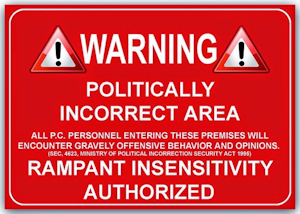This year political correctness seems to be everywhere. In the US it’s a presidential election cycle so perhaps some level of political correctness goes with the territory. But political correctness isn’t just a political phenomenon.  In the private sector, in public sector organizations, in volunteer or charitable work the insidiousness of being “PC” can wreak havoc. Project Managers are faced with this every day and are under pressure either to make sure their project reports are politically correct or that they comply with the politically correct responses required when asked.
In the private sector, in public sector organizations, in volunteer or charitable work the insidiousness of being “PC” can wreak havoc. Project Managers are faced with this every day and are under pressure either to make sure their project reports are politically correct or that they comply with the politically correct responses required when asked.
Here are some ways that being PC can affect how a project management office functions:
Use only praise, never criticism
Anyone who has ever been a parent or a teacher knows how poorly this works. So, when someone does something that doesn’t work, you’re expected to ignore that; to “give it space” and to focus on the praise of the person who made the error. In my experience, praise is worthless if it’s the only thing that you ever express. Saying, “We want to congratulate the ACME project team for their 5th week with no spelling errors in their report,” when the same team missed a major client delivery milestone isn’t productive. What happens when you adopt this practice is that errors are ultimately treated like they’re acceptable and praise becomes meaningless drivel. I’ve adopted the practice of noting when someone does something that made a positive difference and noting when someone does something that makes a negative difference. Now, to be fair, if you only focus on criticism, not praise, you are likely to also end up with terrible results.
One thing I’ll say about this though is that there is a huge difference between pointing out behavior and results than referring to what someone is. You will never hear me say “You’re stupid to have done that.” I’ll say “That was a bad plan and it has produced bad results.” Seem like semantics? Not so much. If you keep saying someone is incapable, they’ll ultimately prove you right. Ineffective actions can be corrected. Being someone ineffective might not.
Speak only of the positives, never the negatives
The positive thinking movement got this practice going years ago. This is like a bank account where you’re only allowed to record and manage the deposits, never the withdrawals. A couple of decades ago, I went through a period of time where my firm, HMS was struggling. Every company that’s been around for 30 years has periods like this. They’re never fun but a small, maneuverable firm like our own has been able to weather them quite well. Not that particular one though. It turned out that our accountant had not wanted to share any “bad news” with management. So, she devised a plan. She would track our revenue on an “accruals” basis so she could display the incoming revenue as soon as we got an order. But, our expenses she recorded on a “cash” basis, meaning that she would only record an invoice we owed if we have the money in the bank to pay it. The result was a near-disaster for our firm. After too many months of making business decisions that were not based on a real view of the company, an internal check-and-balance process raised a red flag and ultimately the truth came out. Her desire to only report good news had resulted in us digging a debt hole so big that we were lucky to be able to climb out.
I have since become much more skeptical of people who only speak of good news. My antenna go up when someone displays the Pollyanna Principle. (Not sure of what that reference means? I’m dating myself but go back to look at a 1960 Disney movie called “Pollyanna” and you’ll see what I mean). One thing about positive thinking that is not obvious but can be terribly damaging is that every time you say “Everything is great” when it really isn’t, you invoke the negative in everyone who hears it.
Don’t measure the results! They might be terrible!
I’ve always been mystified by this but it’s not rare. Recently I watched a volunteer organization consider one of their charitable programs and some members were bold enough to ask what the impact of this long standing program was. Well, no one had any empirical results so naturally the idea of surveying to produce those results popped up. You’d think everyone would want to know the answers, right? Not so much. The proposal to measure the impact of the program was soundly defeated. Someone actually said, “What if we find out that the results are terrible? Our donors might find out that they’ve been funding a program that doesn’t produce positive results!” Sure, that sounds awful, but I can’t imagine that it’s more awful than having those same donors find out that the results could have been measured but ultimately weren’t and the program still didn’t produce the results that were expected.
No result + Good excuse = Result
This is so prevalent, I doubt many people notice when it happens. Someone will not produce a promised result. Perhaps the project came in late or perhaps it went over budget or perhaps a client has complained. Over and over I see people saying “Oh, yes I know that but you see, it was raining.” Then they expect that I will interact with them in the same way as if they had brought the project in on time. Really? The formula is, in fact: No result + Good excuse = No result + Good excuse + Me being irritated with you.
Some people get so caught up in making sure they can lay the blame for results on anyone but themselves that they don’t notice that there usually isn’t something pointing a finger at them to lay the blame at their feet.
Ever had a 3 year old who, when you walked into the kitchen immediately says “I didn’t eat the cookie!” You look at them quizzically because they’re answering something you didn’t ask. But, now that they brought it up, you’re suddenly really interested in how many cookies might be missing.
It’s more productive to focus on an action plan of how to turn your No result into a Result.
Project managers come into contact with people who espouse these practices all the time. It can be a big challenge because at their core, project managers are usually all about becoming more effective. But being committed to improving performance may mean some of those project managers will encounter PC-based resistance. Producing empirical evidence about a project can be met with belief-based rhetoric. Several years ago I was working with an organization about creating a portfolio prioritization process. The worked spanned several months and the people involved were almost all quite senior in the organization. When the resulting formulas and project evaluations that the participants themselves had come up with were presented, there was tremendous resistance.
“My project can’t be priority 55, said one. It’ll never get done.”
“It’s your own evaluation of your project’s importance that has it be priority 55,” I replied.
“Then the formula must be wrong,” they answered.
“But you signed off on the formula being accurate in our last session, I countered.
“It doesn’t matter. We have to change the formula so my project is in the top ten,” was the final edict.
I got through that session and many more like it by setting up a system of almost instant response to this kind of game-playing to reveal the real issue in this organization. The challenge wasn’t what number came up in the portfolio analysis, it was can I have my project before my colleague. That resulted in a process where the key participants could meet and ask for almost anything they wanted and we could show immediately how that would affect all the other managers in the room. It was a contentious process and the doors were always barred under the principle that there are 3 things you should never see being made: 1) Sausages, 2) Laws and 3) The Portfolio Priority List. Still, contentious or not, it got the job done.
Project Managers also learn that there can be a “kill the messenger” practice that can produce terrible results for them personally. It’s not enough to just show empirical results and say “voila!” You have to deal with all the human personalities of what people expect.
You may not want to be completely politically correct but remember there can be real-world impact from just telling the truth. So, as you think about how politically incorrect you’d like to be, think about these tips:
- Just because the real news is terrible and that people really should be confronting it, if you spend a little more time to think of possible actions, that helps not only temper the bad news, it points people into the direction of taking action to correct it.
- If you’re the project manager or head of the PMO, you manage the actual display. There are many ways to show real results that can leave people thinking more positively about them. Alternately, you can do the opposite.
- Blame is rarely useful. So you’ve found that there is a big problem. Ok, got it. To say, “And it’s all Bob’s fault!” brings your analysis from a place where you can be in action to make things better to a place where we are trying to sacrifice someone in the hopes the gods will stop it from raining. Focus on action, not blame.
So, enjoy the political correctness of the election season. I’m sure we’ve not seen the best of it yet. And, in your projects, stay on guard for it!



